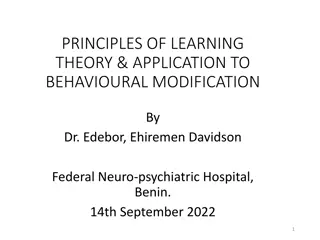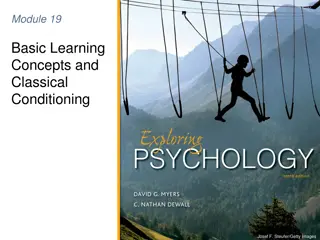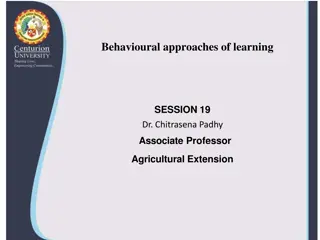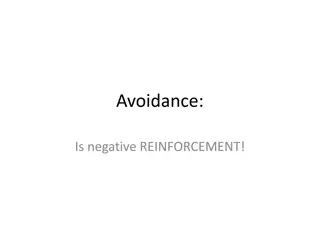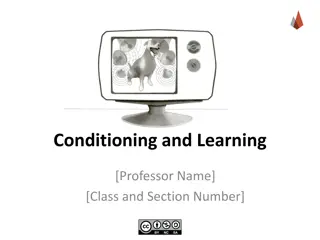Understanding and Applying Operant Conditioning Principles
Explore the various applications of operant conditioning in different settings such as school, sports, work, and home. Discover how reinforcement and punishment techniques can be used for self-improvement and stress management. Learn about the key differences between operant and classical conditioning and how to apply these principles effectively in daily life.
Download Presentation

Please find below an Image/Link to download the presentation.
The content on the website is provided AS IS for your information and personal use only. It may not be sold, licensed, or shared on other websites without obtaining consent from the author. Download presentation by click this link. If you encounter any issues during the download, it is possible that the publisher has removed the file from their server.
E N D
Presentation Transcript
Learning Targets Module 28 28-1 Discuss ways to apply operant conditioning principles at school, in sports, at work, at home, for self- improvement, and to manage stress. Operant Conditioning s Application and Comparison to Classical Conditioning 28-2 Identify the characteristics that distinguish operant conditioning from classical conditioning.
How can operant conditioning techniques be applied? Operant conditioning techniques can be applied at school, in sports, at work, at home, for self-improvement, and to manage stress.
School Online adaptive quizzing allows for immediate feedback. Students receive reinforcement for correct understanding.
Sports The key to shaping behavior in athletic performance, as elsewhere, is first reinforcing small successes and then gradually increasing the challenge.
How do operant conditioning principles underlie superstitions? If a baseball or softball player gets a hit (reinforcement) after tapping the plate with the bat (voluntary behavior), he or she may be more likely to do so again. Over time the player may experience partial reinforcement for what becomes a superstitious behavior.
Work Rewards are most likely to increase productivity if the desired performance is both well-defined and achievable.
Give an example of reinforcers that increase productivity and work performance What would encourage an employee to work harder? Smarter? Faster? Primary reinforcer What would encourage an employee to work harder? Smarter? Faster? Secondary reinforcer
Operant parenting tips: Give children attention and other reinforcement when they are behaving well. Target a specific behavior, reinforce it, and watch it increase. When children misbehave or are defiant, don t yell at them or hit them. Explain the misbehavior and punish it by taking away the iPad, removing a misused toy, or giving a brief time-out. Parenting When parents say get ready for bed and then cave in to protests or defiance, the child s whining and arguing is reinforced. (Wierson & Forehand, 1994).
What Would You Answer? In terms of operant conditioning, which of the choices on the next page represents the best advice to give parents whose young children refuse to eat their dinner? Question on next page
What Would You Answer? cont. A. Do not allow them to watch television for a week for each day they do not eat dinner. B. Give the children a small reward at the end of a week in which they have eaten dinner each night. C. Give the children a small reward each day that they eat their dinner. D. Require them to do extra chores if they do not finish dinner. E. Allow the children to have dessert, even if they do not eat their dinner, in the hopes that they will eat dinner the next day.
Self improvement To build up your self-control, you need to reinforce your own desired behaviors and extinguish the undesired ones.
5 steps toward self-control State a realistic goal in measurable terms and announce it. Decide how, when, and where you will work toward your goal. Monitor how often you engage in your desired behavior. Reduce the rewards gradually. Reinforce the desired behavior.
Researcher Neal Miller, working with biofeedback, found that rats could modify their heartbeat if given pleasurable brain stimulation when their heartbeat increased or decreased. Manage stress There is some evidence that when we have feedback about our bodily responses, we can sometimes change those responses. Later research revealed that some paralyzed humans could also learn to control their blood pressure. (Miller & Brucker, 1979)
What is biofeedback? Biofeedback systems such as this one, which records tension in the forehead muscle of a headache sufferer allow people to monitor their subtle physiological responses.
How are classical and operant conditioning similar and different? Both classical conditioning and operant conditioning are forms of associative learning.
Learning Target 28-1 Review Discuss ways to apply operant conditioning principles at school, in sports, at work, and at home. Teachers use shaping techniques to guide students behaviors, and they can use interactive media to give immediate feedback. In sports, coaches can build players skills and self- confidence by reinforcing small improvements. Managers can boost productivity and morale by rewarding well-defined and achievable behaviors. Parents can reinforce desired behaviors, not undesirable ones.
Learning Target 28-1 Review cont. Discuss ways to apply operant conditioning principles for self-improvement, and to manage stress. We can shape our own behaviors by stating our goals, monitoring the frequency of desired behaviors, reinforcing desired behaviors, and gradually reducing rewards as behaviors become habitual. We can learn from our bodily responses to manage stress; biofeedback is one studied method.
Learning Target 28-2 Review Identify the characteristics that distinguish operant conditioning from classical conditioning. In operant conditioning, an organism learns associations between its own behavior and resulting events; this form of conditioning involves operant behavior. In classical conditioning, the organism forms associations between stimuli events it does not control; this form of conditioning involves respondent behavior.








